Theories abound as to why the United States failed to reach its eighth consecutive World Cup. Among them are poor coaching, poor players, the wrong players, Sunil Gulati, Major League Soccer, a pay-to-play development system, the lack of promotion and relegation, the best athletes playing elsewhere, the collegiate system, and presumably Torsten Frings’ handball. These reasons had or have a part to play. I’ve said as much about a few of them.
But I wonder if the answer for the immediate problem isn’t a bit simpler, if more existential. And our fiercest soccer rival can help explain it.
Several years ago I read an article about the rivalry between the United States and Mexico. For decades, Mexico dominated the United States. The tide began to turn in the 1990s and the United States took control in the 2000s, most famously in a 2-0 win to knock Mexico out of the 2002 World Cup. During the aughts this already fierce rivalry took an even more rancorous turn. This often involved some Marquez-related shenanigans, but included a bizarre slap and that famous stare-down (Mexico fans also chanted “Osama” during a 2004 Olympic qualifier). The games seemed to get dirtier, especially once Mexico fell behind.
The premise of the article was that Mexico’s veterans simply could not accept nor cope with a superior U.S. side. They had grown soft mentally, lulled by a generation or more of a one-sided rivalry. The rivalry has found more balance this decade, in part because a new generation of Mexican players grew up watching a more competitive, talented U.S. team. These younger players respected their rival and could still function if things didn’t go their way initially.
I think something similar has happened to the United States. I wonder if this team failed because no one on this team knew how to handle failure. Of course, the current crop has dealt with some sort of professional failure or even missing out on international youth tournaments. But few have experienced a national embarrassment like in 1998. Few even existed the last time the country failed to make a World Cup. All they’ve known is a dominant United States in the region and World Cup qualifying certainty.
Over the last three or four decades, the U.S. national team has typically been greater than the sum of its parts. It’s a team so often defined by “grit” and dogged determination, one that’s enjoyed only blips of exceptional talent. Vague concepts shouldn’t define a team, but that’s been the national identity.
Yet that has not been the case for much of this qualifying cycle. I saw this team quit more in the last three years than probably in the previous 12 combined, be it against Argentina and Costa Rica last year or Trinidad and Tobago this month. The 2006 match against Ghana was probably the last time I felt we simply gave up, and even that didn’t look nearly as pitiful as we did against Trinidad. I think this mindset stems largely from an inability to cope thanks to nearly two decades of regional success.
Alexi Lalas’ rant last month, where he called the current squad “soft, underperforming, tattoo’d millionaires,” has merit. It certainly touches what I’m suggesting, though I suspect he wasn’t quite making the same argument. We do have a much better system and larger talent pool than we had 20 or 30 years ago. I’d argue on paper that we’re more talented than ever. Despite this, I don’t know how many of the current squad I’d pick ahead of sides from a decade ago or more, because I don’t see this squad able to properly handle adversity. Too many just don’t have the right mentality. Perhaps this debacle will change that.









